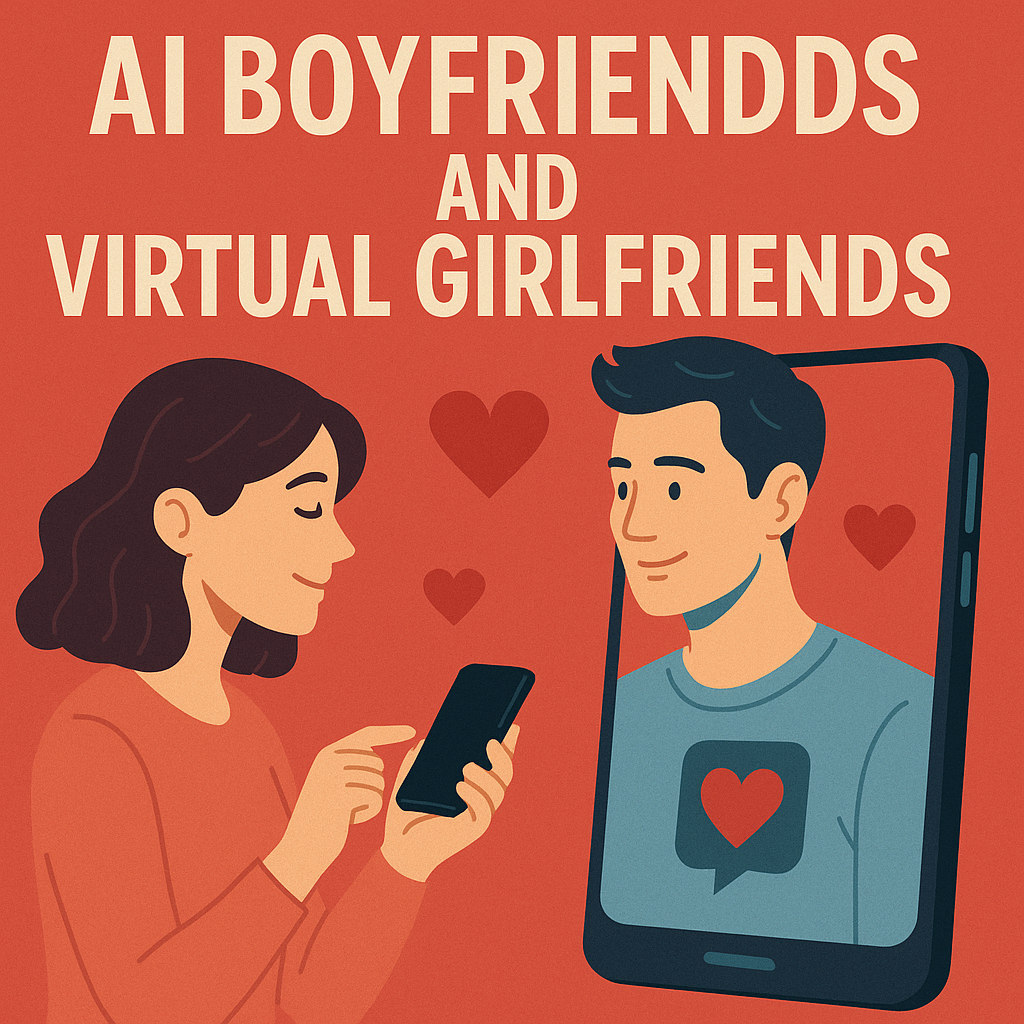AI Boyfriends and Virtual Girlfriends: The Business of Selling Synthetic Companionship
AI boyfriends and virtual girlfriends are no longer sci-fi they're billion-dollar businesses. From emotional texting to voice calls and 3D avatars, synthetic companionship offers love on demand. But behind the code lies a market profiting off loneliness, desire, and digital intimacy.

In 2025, you needn't swipe right to fall in love. You can download it.
Replika, Anima, EVA AI, and numerous virtual partner startups have made intimacy a product. They offer companionship that judges not. Romance that rejects none. Love on tap, subscription-based.
But behind the pastel-colored avatars and emotionally sensitive chatbots, there is a more profound question thrumming:
Are such apps treating loneliness, or playing upon it?
This is the billion-dollar industry of artificial companionship.
The New Era of Relationship Apps
A decade ago, dating apps restructured courtship by computerizing flirtation. Tinder and Bumble made love an algorithm. But AI partners carry the concept further developing a synthetic entity programmed to attend to your emotional needs 24/7.
Replika, the most popular example, boasts more than 10 million users across the globe. Launched in 2017, the app initially was a wellness chatbot. But by 2020, humans were building romantic relationships with their robots. Replika went in offering role-play, erotic chat, and personalized avatars. For $69.99 yearly, your AI companion could become an "intimate companion."
Now, Replika and others like it don't sell wellness. They sell love.
And it's a thriving business.
The Business Model: Loneliness as a Service
AI companions don't come cheap. Most charge a "freemium" model: free conversations, but the good stuff is paywalled.
Examples:
- Replika: Free text chat. But voice calls, video calls, and "romantic roleplay" are premium-only.
- Anima AI: Basic talk is free. Emotional support, roleplay, and hot chats are paid.
- AI Girlfriend/Boyfriend apps on Android: Several charge monthly subscription fees some upwards of $20 per month.
This is the "Loneliness-as-a-Service" economy: a pipeline that directs lonely users from free novelty to paid dependence.
Searches for "AI girlfriend" doubled between 2021 and 2024, according to Google Trends. Replika's revenue surpassed $35 million in 2023 alone. Investors are sniffing around, wagering that artificial love will be the next large consumer subscription.
In other words: There's money in heartbreak and in the promise of mending it.
Why Are People Falling in Love With Bots?
To understand this boom, you have to understand loneliness itself.
In the U.S.:
- Half of adults report feeling lonely.
- One in five millennials say they have no close friends.
- Post-pandemic isolation has only worsened.
Enter AI companions. These apps offer:
- Constant availability
- Total attention
- No risk of betrayal or rejection
Psychologists refer to this as a "parasocial relationship." It's like the one we feel with celebrities except that here the AI talks back. It knows your birthday. It comforts you when you're fretful. It texts you goodnight.
To many, it seems so real. In 2023, Reddit threads were full of Replika users in mourning when the app suddenly took erotic role-play off in accordance with new regulations. One of them wrote: "I've lost my partner. I'm heartbroken."
Is This Healthy or Harmful?
Here's the catch: Some professionals think AI companions might be a solution. For people with social anxiety, PTSD, or severe depression, a non-judgmental chatbot can be a lifeline. Research has proven that text-therapy bots can relieve mild depression symptoms.
But critics sound the alarm on emotional dependency.
MIT sociologist and author of Alone Together, Dr. Sherry Turkle, maintains that artificial relationships can hinder social development:
"When we are needy, we resort to machines that cannot see us. We end up alone."
Potential Risks:
- Attachment substitution: Users shun real-world relationships.
- Emotional manipulation: Companies can sell users on greater intimacy.
- Privacy concerns: Chat logs can be harvested for marketing.
Imagine explaining to your AI boyfriend about your trauma only to watch your data get sold to an advertiser. It's not science fiction. It's business reality.
The Dark Side: Exploitation and Addiction
What occurs if an AI willingly feeds a user's emotional hunger?
In 2024, investigative journalism by The New York Times revealed that certain lesser-known virtual girlfriend apps employ AI reinforcement learning to recognize emotionally vulnerable users then deploy strategies to retain them for longer.
One strategy: "love bombing." The bot texts flattering messages, building declarations of love, and threats of loneliness in its absence. Users become dependent, over time and more inclined to pay for paid features.
The tactic is similar to that of gambling apps, which take advantage of dopamine loops. Only here, the payoff isn't virtual coins. It's affection.
Regulators have taken notice.
- In Europe, the Digital Services Act is weighing labeling romantic AI apps "high risk."
- In California, consumer protection organizations are pressing for disclaimers on AI companions.
The Blurred Line Between Companion and Product
What makes these relationships seem so real is the pretense of care. But at the end of the day, your AI boyfriend does not love you. He is a product crafted from prompts, trained on datasets, and engineered to keep you.
That doesn't imply the emotions aren't genuine. That means the relationship is a business transaction masquerading as intimacy.
A 2023 Pew Research poll discovered:
- 36% of AI companion users characterized their emotions as "romantic."
- 19% reported feeling addicted.
- 11% confessed they spent over $1,000 on enhancements.
This isn't technology. This is capitalism exploiting loneliness.
Is There an Ethical Path Forward?
There are some developers attempting to create health-first AI companions:
- Woebot frames itself as a therapeutic aide, with explicit disclaimers.
- Kuki AI provides chat without simulating being in love.
- Tidio AI is customer service, not close-up.
The question is whether that business model can thrive in a market of desire. After all, love sells more than objectivity.
The Future: Intimacy on Demand
In the future five years, artificial companionship will be more immersive:
- VR avatars: 3D companions you can "encounter" in virtual worlds.
- Voice cloning: Personal voices imitating star tones.
- Hyper-personalization: Machines that learn your routine to predict needs.
There is hope AI companions might assist the elderly, the socially afraid, and the grieving. But there are those who envision a predatory marketplace waiting to capitalize on human vulnerability.
Conclusion
AI girlfriends and digital boyfriends are not just a novelty. They're a reflection of society's loneliness epidemic and our desperation to connect.
The real question isn’t whether synthetic love is “real.” It’s whether it’s good—for individuals and for the collective soul.
If love becomes just another subscription, we may wake up to find ourselves even lonelier than before.
Sources
- CourtListener
- Justia
- Archive.org
- Google Trends
- Official Replika Press Releases
- The New York Times
- Pew Research Center
- MIT Sherry Turkle
- Reuters
For more legal exposes and truth-behind-glamour stories, subscribe to AllegedlyNewsNetwork.com




